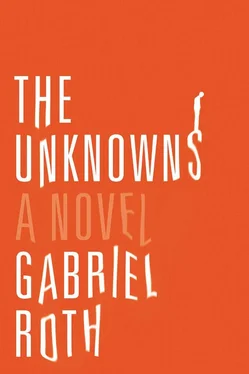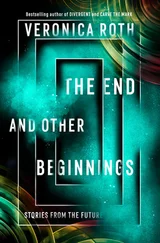Instead, it’s him. It takes me a second to recognize him, because rather than the faceless villain of my imagination he is a specific human being in a herringbone suit. Maya didn’t inherit his coloring — his skin is ruddy and his hair, now gray, was probably once red — but she got his features, and this proof of their genetic connection stirs something queasy in me. Why is he so tall? Maya isn’t tall.
“Thank you for coming down,” he says, stepping back to let me in. The gallery is a wide room crowded with densely wrought objects: bronzes and marbles and terra-cotta reliefs, busts and figures and little mythological scenes, each on a white podium or mounted on the walls. The ceiling is high and the blond wood floor and white walls are deliberately neutral, but there still seem to be too many sculptures; they compete with one another. “I’m so pleased that you’re interested in this stuff,” he says. “Why don’t you sit down. Can I get you some water, or coffee?” His enunciation is nimble, almost British.
At the far end of the gallery are two chairs, with a coffee table between them on which catalogues have been laid perfectly square with the corners. A bit farther are two desks, one grand and wooden, the other small and practical and made of glass. The larger one is covered with books and journals and legal pads, piled and spread-eagled, with Post-It flags marking pages. The other holds only a flat-panel iMac. Donald apparently leaves everything computer-related to his secretary. She said, “So we’ll see you tomorrow at two,” but she’s nowhere in evidence, and it is Donald himself who fetches the coffee. The chair is the kind that sinks your hips down below your knees and settles you into a semireclining posture that will require effort to climb out of. After some business with the coffee that takes place outside my field of vision, he sets it down and sits opposite me.
“Why don’t you start by telling me how it is that you’re here and not in the studio of some San Francisco wunderkind,” he says. His pronunciation of wunderkind is unapologetically German. He crosses his legs and folds his hands on his knee. He reminds me of a psychoanalyst, someone who will listen to your dreams and point you toward what you really love.
I am prepared for this. “I’ve read a bit about Renaissance Italy,” I tell him. “I recognize it. It was like the sixteenth-century version of Silicon Valley.” He smiles. “I don’t just mean all the money floating around, I mean the innovation, the new ideas.”
“When they rediscovered the art of antiquity, a whole new world opened up,” he says.
“It was like the solution to every problem they’d ever faced was lying there waiting for them to find it and put their name on it and make a ton of money,” I say. He seems to like this.
“Now I know you work in technology,” he says. “I’m going to seem very ignorant to you, because I am. Do you think you could explain what it is that you do?”
Apparently Donald prides himself on acquiring a deep understanding of his clients’ tastes and desires. “I write computer programs,” I say. He nods. “I started a company that made a particular program, and a little while ago we sold the program to a much bigger company, and now I’m out of a job.”
He steeples his fingers. “And no one had made this kind of program before?”
“No one had made one that worked as well as ours did.” Among men in offices, this kind of boasting passes for hard-nosed realism, and Donald responds with a little moue of tribute.
“You must be clever, of course, but I don’t know enough about your field to know what sort of cleverness it requires,” he says. “Is there a lot of mathematics?”
“There’s some math,” I say. “There’s more design than math. Where it overlaps with math is that it’s satisfying for people who like closed systems.”
“Tell me about the design,” he says. “I assume you don’t mean design in the visual sense.”
This gentle interrogation is reducing me to a pleasant state of passivity, the kind children experience when a benevolent adult asks them questions to which they know the answers. “It’s like architecture, a little,” I say. “You’re working with all these constraints — the limits of the environment and the hardware and the language — just like an architect has to worry about gravity and wheelchair ramps and where to put the plumbing. But you’re building something for people to use, and you want them to be happy when they’re using it.”
“I understand,” he says, making it sound like a compliment to my explanatory skills. “And your ability to do this has made you quite a lot of money.” The quasi-British inflection makes it unclear whether he’s using the word quite to intensify or to qualify the amount of money I’ve made. “It can be very disruptive, money,” he says. “A lot of my clients made their money all at once, in a big lump, like you. There’s a strange thing that happens: the fulfillment of a dream always brings with it some larger disappointment about the dream itself. Have you found that?” It’s impossible not to see Maya in him.
“Something like that,” I say. “It was different because I wasn’t trying to get rich.” I was trying to get out of Colorado, and to distract myself from my loneliness.
“Yes, that would help,” he says, and he seems glad about it. “Well, I’d be happy to show you what’s here and talk you through it. If you’d rather be alone with the work, I can step into the other room. But there’s something in particular I think you might be interested in.”
We haul ourselves out of our seats and he leads me to a podium on which a bronze Mercury, in winged helmet and sandals, extends his left arm upward. The original Flash had a helmet like that. It makes me think of the famous cover of Flash issue 123, “Flash of Two Worlds,” in which the streamlined Flash of the modern era crosses into a parallel universe and meets his helmeted Golden Age counterpart.
“Giambologna,” Marcom says. “The link between Michelangelo and Bernini.” He clears his throat. “There’s a story about Giambologna in Vasari. He was a young Turk, very impressed with himself and his abilities. He’d just arrived in Rome, and he made a wax model and finished it with exquisite care and delicacy, and he took it to the studio of the great Michelangelo.” He uses the Italian pronunciation. “And Michelangelo took the model out of Giambologna’s hands, this young upstart who had, you know, dared to cross his threshold, and he began to remodel it. He destroyed Giambologna’s model, reshaped it into something completely different. And he handed it back to Giambologna and said, Now go away and learn to model before you learn to finish .”
He’s not smiling anymore.
“Now, would you mind telling me why you’re here?”
I’ve had it all wrong.
“Have you come to do some kind of violence to me?” he says.
“Jesus,” I say. “No. That’s not it.”
“You came to see what a monster looks like?”
“I just wanted to find out the truth.”
He takes a deep breath, and as he lets it out his features soften. “Then I’m very glad you’re here,” he says. “There are certain accusations, even today, that still compel belief merely by being issued. Are you in love with her?”
“Yes, I am,” I say, taken aback by the question but also suffused with the kind of pride we reserve for unambivalent feelings.
“I’m glad,” he says. “I hope she always has someone to love her, especially someone like yourself.” The word love sounds strange in his precise diction, the way it does in old movies. “You couldn’t have gotten to where you are if you weren’t a rational person. And so I’m going to implore you: Look at the evidence. Look at the science, the pseudoscience, that these people use to justify themselves. Just look — skeptically, rationally look — and make up your own mind.”
Читать дальше












